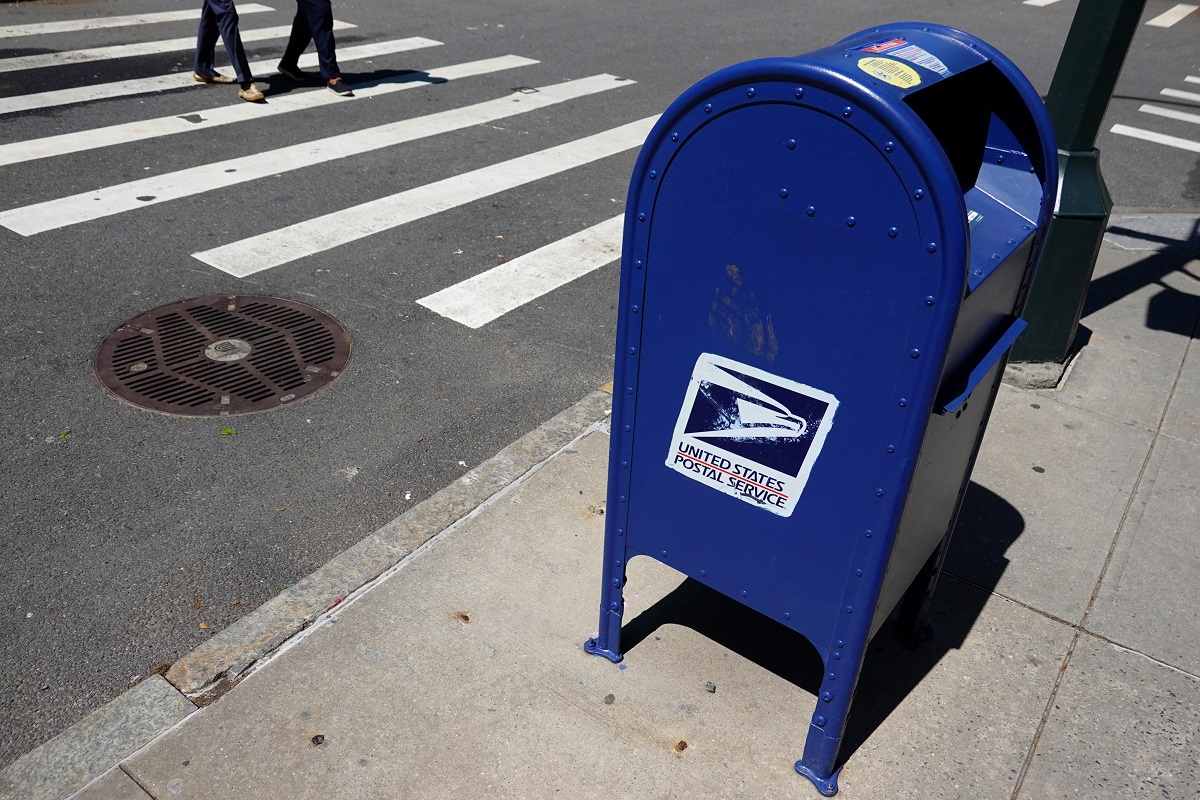
A United States Postal Service (USPS) mailbox is seen in Manhattan, New York City, U.S., May 9, 2022.
17:12 JST, June 25, 2024
The U.S. Postal Service has shared information from thousands of Americans’ letters and packages with law enforcement every year for the past decade, conveying the names, addresses and other details from the outside of boxes and envelopes without requiring a court order.
Postal inspectors say they fulfill such requests only when mail monitoring can help find a fugitive or investigate a crime. But a decade’s worth of records, provided exclusively to The Washington Post in response to a congressional probe, show Postal Service officials have received more than 60,000 requests from federal agents and police officers since 2015, and that they rarely say no.
Each request can cover days or weeks of mail sent to or from a person or address, and 97 percent of the requests were approved, according to the data. Postal inspectors recorded more than 312,000 letters and packages between 2015 and 2023, the records show.
The surveillance technique, known as the mail covers program, has long been used by postal inspectors to help track down suspects or evidence. The practice is legal, and the inspectors said they share only what they can see on the outside of the mail; the Fourth Amendment requires them to get a warrant to peek inside.
But the Postal Service’s law enforcement arm, the U.S. Postal Inspection Service, has traditionally declined to say how often it facilitates such requests, saying in a 2015 audit that such details would decrease the program’s effectiveness by “alerting criminals” to how the technique works.
For that audit, the agency said it had approved more than 158,000 requests from postal inspectors and law enforcement officials over the previous four years. The IRS, FBI and the Department of Homeland Security were among the top requesters.
In a letter in May 2023, a group of eight senators, including Ron Wyden (D-Ore.), Rand Paul (R-Ky.) and Elizabeth Warren (D-Mass.), urged the agency to require a federal judge to approve the requests and to share more details on the program, saying officials there had chosen to “provide this surveillance service and to keep postal customers in the dark about the fact they have been subjected to monitoring.”
In a response earlier this month, the chief postal inspector, Gary Barksdale, declined to change the policy but provided nearly a decade’s worth of data showing that postal inspectors, federal agencies, and state and local police forces made an average of about 6,700 requests a year, and that inspectors additionally recorded data from about another 35,000 pieces of mail a year.
Barksdale said in a letter to the senators in June 2023 that the program was not a “large-scale surveillance apparatus” and was focused only on mail that could help police and national security agencies “carry out their missions and protect the American public.”
The practice, he added, had been legally authorized since 1879, a year after the Supreme Court ruled that government officials needed a warrant before opening any sealed letter.
“There is no reasonable expectation of privacy with respect to information contained on the outside of mail matter,” Barksdale wrote.
Wyden said in a statement, “These new statistics show that thousands of Americans are subjected to warrantless surveillance each year, and that the Postal Inspection Service rubber stamps practically all of the requests they receive.” He also criticized the agency for “refusing to raise its standards and require law enforcement agencies monitoring the outside of Americans’ mail to get a court order, which is already required to monitor emails and texts.”
Anxieties over postal surveillance are classically American. In 1798, Vice President Thomas Jefferson wrote in a letter that his fears of having his private communications exposed by the “infidelities of the post office” had stopped him from “writing fully & freely.”
In their letter last year, the senators said that even the exteriors of mail could be deeply revealing for many Americans, giving clues about the people they talk to, the bills they pay, the churches they attend, the political views they subscribe to and the social causes they support.
In 1978, a circuit court judge said the mail covers could expose someone’s personal life “in a manner unobtainable even through surveillance of his movements,” rendering “the subject’s life an open book.”
Top Articles in News Services
-

Survey Shows False Election Info Perceived as True
-

Hong Kong Ex-Publisher Jimmy Lai’s Sentence Raises International Outcry as China Defends It
-

Japan’s Nikkei Stock Average Touches 58,000 as Yen, Jgbs Rally on Election Fallout (UPDATE 1)
-

Japan’s Nikkei Stock Average Falls as US-Iran Tensions Unsettle Investors (UPDATE 1)
-

Trump Names Former Federal Reserve Governor Warsh as the Next Fed Chair, Replacing Powell
JN ACCESS RANKING
-

Producer Behind Pop Group XG Arrested for Cocaine Possession
-

Japan PM Takaichi’s Cabinet Resigns en Masse
-

Man Infected with Measles Reportedly Dined at Restaurant in Tokyo Station
-

Israeli Ambassador to Japan Speaks about Japan’s Role in the Reconstruction of Gaza
-

Videos Plagiarized, Reposted with False Subtitles Claiming ‘Ryukyu Belongs to China’; Anti-China False Information Also Posted in Japan





















